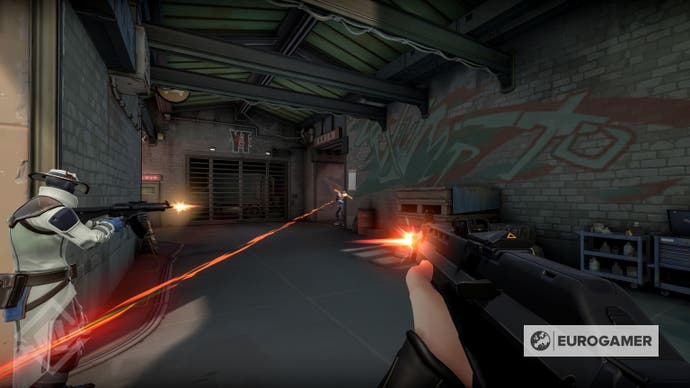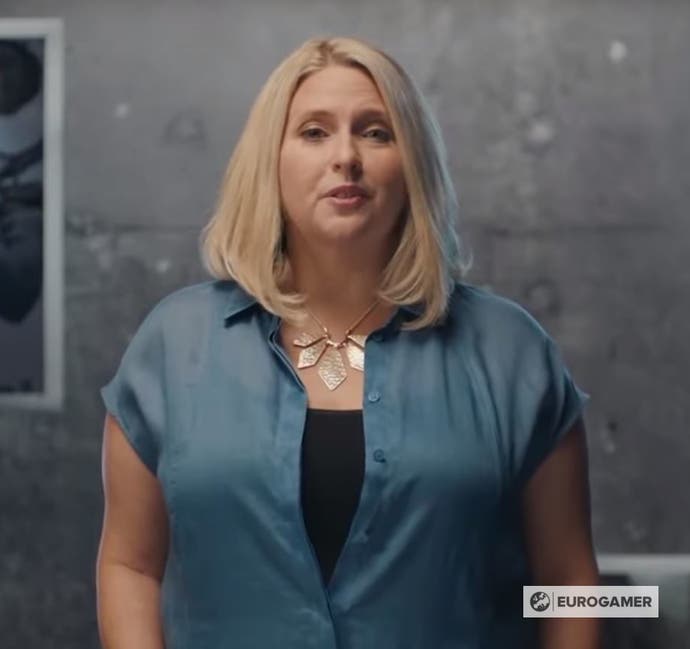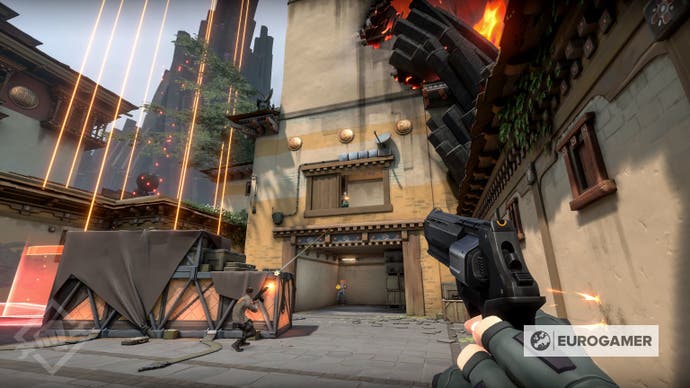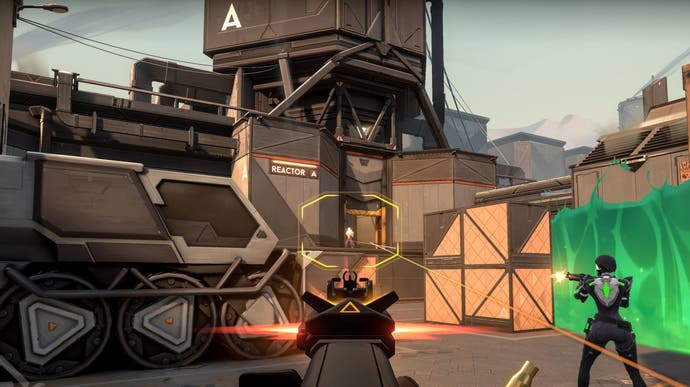Riot Games on Valorant's competition, toxicity, and why 2020 isn't too late for a team-based shooter
"We don't have a wall up that says 'Must be better than Counter Strike'".
Project A, one of several games announced in a wave of 10th anniversary fanfare at the end of 2019, is now officially called Valorant. It's free-to-play, it's releasing in Summer 2020, and as you might have read in our lengthy Valorant preview, it looks pretty slick.
That said, our hands-on time with the game threw up plenty of questions, too. The most obvious one: why a tactical shooter? And why now, so long after Overwatch, Rainbow Six and Counter Strike seemingly cornered the market?
Then there's Riot's unusual opening gambit, opting to lead with such a huge blast of technical info, and promises about stability and anti-cheating, over introducing us to the world of this game itself. What will the in-game purchases look like? And, after a decade of League of Legends, what has Riot learned about curbing its huge problem with toxicity?
We talked to lead producer Anna Donlon and game director Joe Ziegler about that and plenty more, with the two of them seemingly keen to cool any suggestions that Valorant is taking on its obvious competitors - as much as it may appear to be doing just that.

So, very high level to start with, you talked about this a bit already but when exactly was Valorant greenlit?
Anna Donlon: Yeah, so here's what I'll say. Riot's approach to greenlighting games has been evolving the entire time this game was in R&D. So, "greenlit" is a hard concept for us to kind of get our heads around. Riot's approach is: there's a certain amount of commitment and investment that goes into the game once we decide we're actually going to ship it. So there's a certain expectation that the game is actually going to be a game worth shipping before making that investment. So when I look at traditional game development, like even kind of where I came from before here [Treyarch, one of the Call of Duty studios], there's all these different phases for us. There were those phases, but there's a moment where we were like, "yes, absolutely all in," and our game was probably significantly further along than you'd expect.
Joe Ziegler: And further along than a lot of games, yeah.
AD: So, for us, what we will consider "full production" - fully all in - has been for the past year and a half. A year and a half now, probably more in a pre-production phase for a couple years before that, and then a very early R&D phase for a bit of time before that.
Was there a specific thing Riot overall was trying to target? As in, "we want you to work on these types of games" and then you can go ahead and incubate ideas. Or was it literally a blank cheque, blank page, go ahead and just start with whatever you want, and Valorant is what you landed on?
JZ: So a lot of the - when we started the sort of thinking about this project - a lot of the impetus for driving the project was actually just familiarity with this space [tactical shooters] and a desire to create something that will expand upon it, more than anything else. I don't think any of the projects you see, even Legends of Runeterra, none of them started with them telling us to go research something. It was actually mostly groups of people together and said, "Hey, here's a concept that we sort of explore." And if it fails, let's fail early, and then we go back and work on other things. But if it succeeds, let's keep investing.
There's probably gonna be some people who will say you're about 10 years late to the party, right, releasing a character-based tactical shooter in 2020? What would you say to someone who would put that to you?

AD: There's probably a better answer than this. [laughs]
So for me, on a personal level, like, I've been playing games for 30 years - maybe more of my life - and I'm constantly looking for new games to play. And now I have children. And I'm watching my children start to play games. And I think, "late to the market" for me feels like we've already said there will never be another "this", or we can never do it because you have to stop innovating, or shooters are done. I think what we're bringing to the table is something that could actually be exciting to a whole new group of players, players who wouldn't even think of themselves as players of this game. I think a lot of people have asked us, not here just like within the walls of Riot, like "Who do you think you are taking on a shooter?" [Both laugh].
Like that's honestly a question we get a lot. I don't think we think of it that way because we don't think of it as "We're taking on the shooter world" or like, "we're going to be the next big shooter". It's more just like what kind of game do we think players are wanting to play right now? What do we have to bring to the table and we the right company to do that, and were we the right team to do that. Like, I think it just feels like a very genuine version of development. So that's my version of the answer.
JZ: So that was an excellent answer [laughs]. My version is actually like, from our perspective, having played a lot of tactical shooters over the course of decades, I actually think tactical shooters are a kind of timeless concept that is always constantly in iteration. You see different versions of it occurring here and there. I think for us, the idea was, "What is the version that we can build a service around, that's constantly always going to evolve?" And for us that access point of creativity is about reinforcing both the uniqueness of different players and sort of how they've actually evolved. But on top of that there's a social layer of creativity where people share ideas, and I think really evolving things in the modern era is about building games to have social interactivity as a cause behind them.
There's got to be an element of you feeling you can do something better than what's already out there, so what's the thing that Riot's bringing that others currently aren't? What makes you go "This is why we're better than those 12 other shooters we listed as inspirations"?
JZ: I would say internally what we aspired to be is that [level of] strength, just like the idea of being able to connect players and developers and connect players to the games that they're in end and really focusing less upon, "Hey we have a specific authoritative vision", rather than going we're going to work with players to really build experiences in the right way as time goes on, so in a weird way I'd say our best our best strength is actually listening to players? [laughs]. Because players are probably the best truth you know! But that doesn't mean we don't do a lot of grunt work analysing and thinking about players want, and looking into what current things our service can do.
AD: I mean, it's like a risky answer right? Because I think it can kind of come across as if we don't actually know we're doing, we're just waiting for players to tell us what we should do. But there's a certain truth to part of that which is: we think we know what we're doing, we feel confidence in releasing this game. But we're not making it for us. And I think that's something that we remind ourselves on the team quite a bit when we're making very specific decisions - that it's not for us, it's for them. And the more we can reinforce that, the better an experience we're going to be able to provide them.
So yeah, I mean, it's the middle of everything we do. We don't have a wall up that says "Must be better than Counter Strike" or, "Must take half Overwatch's playerbase" like that's, those aren't actually our goals. Our goals are more about getting our game out and evolving it with our players and growing a community. That's literally our goal. How wide and broad that can go is what we're excited to see. But, our win condition is we put something out there that players want to build with us, that's literally our win condition.
JZ: Yeah and that we can build a core community around.
AD: Yeah.
So there isn't like a, "this is our Overwatch killer" mindset.
AD: No!
JZ: No, no, no, [laughs]. We don't even strategise like that as a company.
AD: We just don't! Maybe we should! But we just don't.
It would be fun if you did! Much more dramatic...
AD: [Laughs] Look, for us it's like, you look at League's success [and think], "Would we want that for our game?" Absolutely. We want that for our game, but we don't look at it as "...and in order to do that, we have to kill another game." Because we like those games too. And we like that players like those games. We learned a lot from those games so... we get a lot of like, "Who's your biggest competitor? Who're you going after?" Obviously we know that that's a real concept. It's not like we're delusional and we're like "Competition? What's that?!" But I just don't think it's how we think about how we're making the game.
JZ: We look at a game like Overwatch and we look at a game like our game - we see why certain players would play Overwatch, we see why certain players would play our game. And so, I think it's great that technology means you could probably play both in your lifetime and really enjoy both. But as far as it goes in terms of "Hey, we're gonna kill this game," we're carving our own space.
AD: I will say, I think the one thing that is really interesting in all conversations we've had is we kind of come at it from the angle of: "Who are we not going to alienate?" And I think that's actually been, really, a big part of the conversations around the game design, and even how we talk about the game. It's like, let's make sure we don't alienate players by making choices that just completely turn them off right out of the gate. Instead of going out and saying, you know, what we're doing better over here. I mean I definitely did that in my League ten-year video when I'm like "We're gonna go kill peekers' advantage!" [Laughs]

I mean, I definitely went hard on those things, but I think those are the places where we think we have the ability to do better. And I think, maybe the constraints or the realities of certain publishers, like how they do their business or whatever, prevents them from going all in on that player experience in a way that Riot's super committed to. And so for us it is that player experience first and foremost, and we'll spend big on those types of things.
Do you think that there's an element of sacrificing approachability - or even just an air of approachability - by going so hard on like the buzzwords, the hardcore stuff? A lot of people don't know what 128-tick servers mean, for instance.
JZ: So, two key things, [one] is understanding that your game is probably not going to be for everybody. There's definitely going to be a group of players that are attached to your game, and then a group of players who'll discover it and really enjoy it. And I think the common perception is that, a game that's hard, and deep, and very difficult to understand, players won't come and gravitate towards learning. But, I feel like we've learned the opposite through League of Legends. We create games and what we discover is, the more players actually build communities and learn towards them, the more it brings out the sort of core gamer in everybody [laughs]. You know it's actually kind of common right?
AD: Yeah!
JZ: So for us like, it's actually that's the view of the world we kind of see - it's not so much that the alienation points are more along the lines of like "Hey, they have no way to learn, is there a way they can discover a way to learn?"
AD: You only have one chance to say the first thing, you know? We definitely thought about "What's the first thing we want to say about this game?" We had one chance to say the first thing and we had to really think about who we wanted to talk to in that moment. We're going to have many more chances between now and launch to talk to a bunch of different parts of our audience about a bunch of different things are going to be appealing to them. But if we have one chance to say the first thing, I wanted to make sure when we were talking to the people that are currently feeling a certain type of pain or certain type of need, that we are uniquely positioned to address.
And I think that was the most [important], because that is Riot, that is what makes us special, from my perspective: that we will fix those things, and that maybe makes us less profit or maybe makes us have to take bigger risks or whatever, but those are the things we're going to prioritise. And if you hear that first, then you can get more excited about what kind of story we're going to tell or what our modes are going to look like. We have time to do that, but if we don't talk about those core pain points right out of the gate, and we talk about all those other things, then we're just gonna sound like any other thing, and that we're not getting it. We want to make sure that we get it.
On the topic of new players then, obviously in League of Legends there is an ongoing battle with toxicity, and the fact that, naturally, whenever you have an element of hardcore-ness to a game, there's going to be toxicity that comes with it. Have you done anything ahead of time, to try and get ahead of it with Valorant? Because with LoL it feels almost too late.
JZ: Definitely we're trying to get ahead of it. I think, so, whenever you bring 10 people in a room like yesterday [during the gameplay sessions], there's gonna be an element of sort of "passion" that comes out, and that can turn into toxicity. I actually would argue that LoL is also still trying to innovate this space. What we're trying to do as a company is centralise all those efforts, and draw from that as we go. So, we've learned a lot from how LoL ran into issues with players in the past. I think on ours, we have a unique set [of issues] because our gameplay is a little bit different, but there are also central sort of concepts of how players play together and how players interact that we want to actually make sure we get ahead of this time.
So we'll be using technology from the shared Riot concepts, and having specific salves around certain features that we have inside of our game - without talking specifically about those features! I probably shouldn't right now [laughs] - but those specific salves inside of our game, we've done a lot of research to actually make sure and do that work. Just like any solutions thing, half of it is stopping people from hurting other people, and the other half is teaching them the better way to do it.
Monetization - you talk a bit about the fact Valorant is going to be free to play, with transactions for cosmetics only. Have you got loot boxes in the game?
JZ: That is the best question I've actually seen, shoot across the bow!
AD: Not right now!
So you're not ruling them out?
AD: I think - I think when people hear "loot boxes" it's like, you know, it's a very strong topic right now. Everyone's talking about this right now. We don't believe in predatory practices. We won't do anything that feels that way. I'd hate to say we wouldn't have a mechanic in the game that offered for some sort of randomisation that helped really good players - and then people say "Yeah, but that's just a loot box". So we are taking a lot of time to think about what our version of that could be. And if we can't find a version that feels good we won't do it.
JZ: I think fairness matters a lot, I think also not putting it in a gameplay space matters a lot. I really don't want anything to feel like it gets between you and the game.
AD: Yeah. And we've seen versions of it that are really effective, and really feel very rewarding. It's certainly not where we started though. I think we actually probably were making steps in that direction, when a lot of the kind of recent buzz and conversation happened about it. And it really gave us a moment to say, "You know what, even though we believe in our plans, let's take a second. Let's see how things evolve. Let's find our own version of it. Let's test that version, before we just stick it out there." Because I don't - that's hard to recover from. I don't want that to be my first day story. That's definitely not how I want to go out there. So, I'm open to finding the right way.


